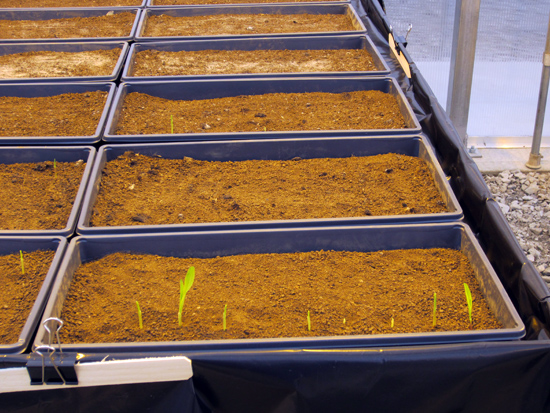UK researchers conducting comprehensive poultry litter study
UK researchers conducting comprehensive poultry litter study

Previous research studies have shown poultry litter applications have many benefits for corn and soybean producers, but these benefits have not been quantified or integrated into one comprehensive research study. UK College of Agriculture researchers are doing just that.
UK extension soils specialist Edwin Ritchey is leading the study to explore whether poultry litter applications can increase yield, allow for better water infiltration, improve soil water-holding capacity and add organic matter to the soil in Western Kentucky corn and soybean operations. He will also study whether one of the crops receives more value from the poultry litter, if nutrient values vary among poultry litter sources and if producers receive a yield boost from applying both poultry litter and nitrogen to their fields.
“This research should determine whether poultry litter, in addition to providing plant nutrients, can improve soil quality without adversely affecting insects, diseases and weeds,” Ritchey said. “If it can, and if producers can economically obtain it, it might be preferred over a strict use of commercial fertilizers.”
As part of the research, UK extension weed scientist Jim Martin and UK extension plant pathologist Don Hershman will study poultry litter’s effect on weeds and disease pests, particularly the soybean cyst nematode.
“The soybean cyst nematode has been found in all major soybean producing counties in Kentucky, and it is the most damaging pest of soybean in the state, reducing state soybean productivity by 2 to 5 percent, depending on the year,” Hershman said. “Up to 30 percent yield loss can occur without any visible symptoms being produced.”
The study is funded by the Kentucky Soybean Promotion Board and the Kentucky Corn Growers Association.
In 2012, Ritchey selected four producers’ fields in Daviess, Hopkins, McLean and Henderson counties for the study. He selected these fields because they have low to medium nutrient values in the soil and soybean cyst nematodes. The fields range in size from three to five acres. Researchers gathered initial baseline data from the fields in 2012 and will sample the fields more intensively in March. Researchers will apply poultry litter to two cornfields and two soybean fields in the spring prior to planting. They will collect data throughout the growing season, culminating with yield data at harvest.
Greenhouse research to test for the presence of the weed seed in poultry litter began in January at the UK Research and Education Center. Field research concerning whether poultry litter alters weed species or weed growth will begin in the spring and continue throughout the season with the goal of collecting samples before the grower applies herbicides.
“There’s some concern that poultry litter may contain weed seed and by applying poultry litter, growers may introduce new and different weeds into a field,” Martin said. “We’re not sure if that’s the case, so that’s why we’re testing the poultry litter in the greenhouse and in the field.”
In addition, Ritchey received the results of the 2011 poultry litter nutrient tests conducted at the UK Soil Testing Laboratory in Lexington this winter. He will analyze these results to see if the nutrient content varies among poultry age, type and integrators.
Agricultural Economics Extension Plant & Soil Sciences Research


